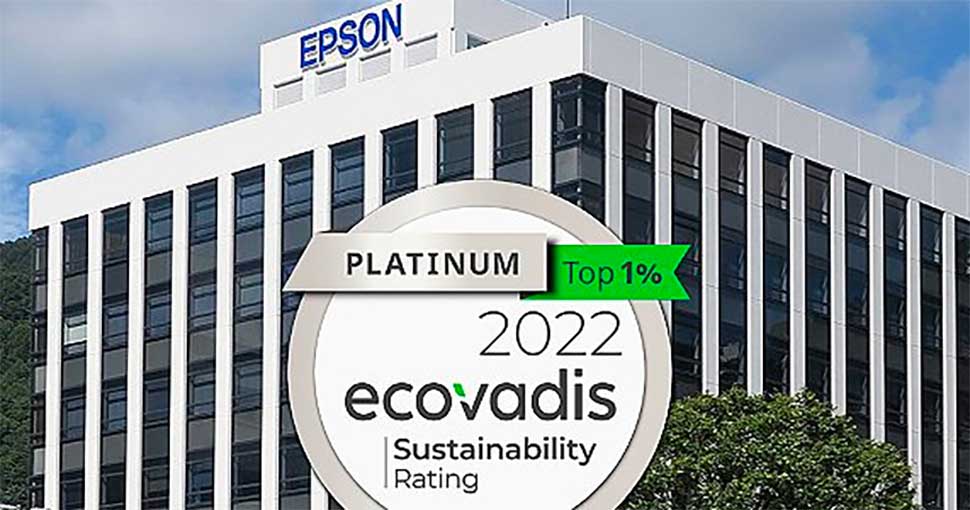This is in recognition of the company’s global efforts to uphold the highest standards on the environment, labour and human rights, ethics and sustainable procurement, and highlights Epson’s commitment and actions on sustainability.
The platinum rating ranks Epson in the top 1% of companies in its industry, particularly excelling in the fields of the environment as well as sustainable procurement. The independent evaluation methodology is based on a framework of 21 sustainability criteria mapped to global standards and guided by the international scientific community. Customers can trust this independent certification and be assured Epson is one of the most responsible and accountable companies in its sector.
EcoVadis is a recognised business sustainability ratings organisation covering 200 industry categories, 175 countries and regions, and over 90,000 companies of all sizes worldwide. Epson’s latest platinum rating reflects its ongoing commitment and notable improvements towards sustainable growth in the past year.
This platinum certification follows Epson’s ongoing implementation of measurable initiatives to help identify and resolve societal and environmental issues. Epson made strides towards this goal by switching to 100% renewable electricity last year at all major sites in Japan, becoming the first manufacturer to do so, and is now working to do the same at all group sites globally by 2023.
As a leading technology company, Epson is committed to helping customers reduce their environmental impact, leading the way by engineering innovative solutions. These include heat-free technology, energy efficient printing technologies and PaperLab, which turns wastepaper into new paper in a virtually water-free process. All of this helps to achieve circular, sustainable and net-zero operations.
With an increased focus on supply chain sustainability and net-zero goals, EcoVadis’ independently verified tool assesses companies’ performance in terms of how they have integrated the principles of sustainability into businesses and management systems.
Yasunori Ogawa, global president at Epson said: “Our company is focused on achieving sustainability through our products, technologies and operations. This third consecutive platinum accreditation is the result of a lot of hard work and highlights the steadfast commitment and actions by the entire Epson team as we seek to achieve a sustainable future.
“The rating shows that in addition to being a leader in our industry for product excellence and innovation, we’re also at the forefront when it comes to making our industry more sustainable.
“In line with our Environmental Vision of becoming carbon negative by 2050, we will continue to challenge ourselves to perform to the highest standards for sustainable practices, both as an organisation and a member of the wider global community.”
Henning Ohlsson, Director of Sustainability, Epson Europe, added: “As a business, we acknowledge that we have a responsibility to make a positive contribution towards society. Being recognised with the platinum accreditation for our performance by EcoVadis for a third year running is an achievement of which we are very proud and a testament to our continued actions.
“We understand that sustainability is increasingly important to all our customers and this latest accreditation reaffirms our commitment to leading the way in improving our society, through better products and business practices.”
Epson is committed to becoming carbon negative and underground-resource free by 2050 and has made a number of measurable commitments related to sustainability and community impact. Focused on solving societal issues, it publishes details about its environmental initiatives, the creation of social value, corporate governance, and other CSR activities in its Sustainability Report.



